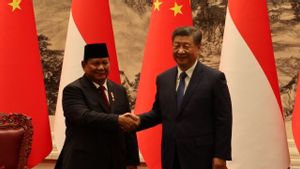JAKARTA - The World Bank (World Bank) projects that Indonesia's economic growth this year is zero percent or no growth at all compared to 2019. It is hoped that the recovery process will start gradually, although the projection base this year is still very weak. Indonesia's economic growth will increase in 2021 to 4.8 percent.
World Bank Indonesia Lead Economist Frederico Gill Sander said that Indonesia will also experience significant economic growth in 2022, the figure reaching 6 percent.
Furthermore, Frederico explained, the current account deficit (CAD) is expected to decrease this year, but as the economy recovers, the World Bank estimates the CAD will widen a little more.
"This year's GDP is expected to be 0 percent. If the social restrictions (PSBB) continue and global economic growth also contracts deeper, the Indonesian economy could contract 2 percent this year," he said, at the launch of the Indonesia Economic Prospect, Thursday, July 16.
Without massive support from the government, Frederico said, negative growth would have a significant impact on increasing the poverty rate in Indonesia. This is especially so if social assistance (bansos) is not distributed on target. Therefore, it should really be given to people in need.
Furthermore, Frederico assessed that targeting is very important for the Indonesian government, especially for those who have lost their income or jobs due to the pandemic.
"We have seen that all people can start to feel the benefits of this social assistance. For about four to five months, almost half of the people living in poverty have received assistance from the government," he explained.
Previously, the Indonesian Chamber of Commerce and Industry (Kadin) predicted a contraction of economic growth between minus 4 percent to minus 6 percent in the second quarter of 2020. This is because the stimulation process for handling COVID-19 is still very slow.
Chairman of Kadin, Rosan Roeslani said, the slow handling of COVID-19 can be seen from the absorption in various fields. For example, in the health sector, it only reached 1.54 percent, social protection 28.63 percent, business incentives 6.8 percent, MSMEs 0.06 percent, corporate zero percent, and sectoral 3.65 percent.
"This will make the pressure on health recovery, social security networks and the economy heavier," he said some time ago.
Rosan assessed that the weak implementation of the stimulus will cause Indonesia's economic growth in the third quarter to contract again at a negative growth level. So that technically, Indonesia is entering an economic recession phase.
The English, Chinese, Japanese, Arabic, and French versions are automatically generated by the AI. So there may still be inaccuracies in translating, please always see Indonesian as our main language. (system supported by DigitalSiber.id)












